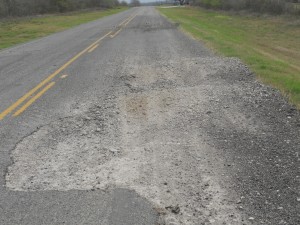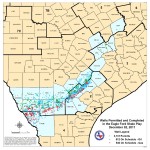Roads Killed: Texas Adds Up Damages from Drilling
Texas could be looking at spending possibly hundreds of millions of dollars for road repairs and improvements to cope with the surge in oil and gas drilling.
“We have a task force [that] in the next 90 days is going out and talking to all the partners involved in the activity to see what we can do,” Mark Cross, spokesperson for the Texas Department of Transporation (TxDOT) told StateImpact Texas.
Cross said the state has already made $40 million available for immediate paving of ripped up roads in the areas of heaviest drilling activity: the Barnett Shale in North Texas and the Eagle Ford Shale in South Texas.
“The impact the trucks are having is roughly equivalent to eight million cars annually,” said Cross.
Hydraulic fracturing, the process that’s bringing up oil and gas from fields once thought to be depleted, requires millions of gallons of a mixture of water, sand and chemicals. TxDOT figures the average well requires 1,200 loaded trucks to bring it into production. Many of the wells are in rural areas where roads were originally designed for tractors and produce trucks, not tankers.
“It’s starting to degrade faster than we have ever anticipated. It’s starting to impact some of the major roads in our system that are going to be a higher cost to fix,” said John Casey, TxDOT’s District Engineer in the Corpus Christi area.
Casey said the big trucks are often too wide to pass two-abreast on rural roads so they run off the pavement, eroding the roads’ shoulder. Then there are the potholes. Or craters, as Casey calls them.
“There’ll be a crater in the road. It might be five to ten feet wide, it could be a foot deep. All of a sudden, it just appears,” said Casey.
Casey figures that in his district alone, they need $22 million for critical repairs but have received only $10 million. He said it will take much more to make other fixes as well as longer term improvements.
“We’ve just seen the beginning of it. I mean, people are talking now that this is going to be a 20 or 30 year deal,” Casey told StateImpact Texas.
Should the drilling industry help pay the bill? Whether it’s for roads or other government services, there is a precedent. In DeWitt County just southeast of San Antonio, local officials negotiated an $8,000 fee per well to help repair county roads (as opposed to state roads). In North Texas, the Arlington city council just enacted a $2,397 annual fee per gas well to help set up a special unit in the fire department to respond to well fires and leaks.
TxDOT said its task force will talk to drilling companies about voluntarily sharing the cost of fixing the roads but anything beyond that may require action next year by the Texas legislature.
“The Texas Oil and Gas Association is well aware of the road conditions and concerns that have emerged alongside incredible economic activity and commerce in Texas,” said Mari Ruckel, the association’s Director of Public Affairs.
While Ruckel said the association has formed its own committee to look at what the industry can do to address the road issue, she said that oil and gas producers were already paying substantially into government coffers. She said that in 2010 alone, they paid $7.4 billion in Texas severance taxes, local property taxes and royalties.
“The economic benefits are rippling into cities, counties and school districts,” Ruckel told StateImpact.
The issue could a thorny one for the state legislature. Already, there have been calls to close a big tax break the state grants gas well owners.



